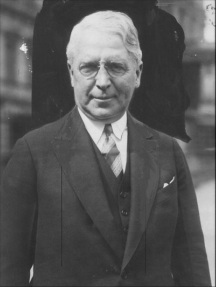
John North Willys
October 25th, 1873 - August 26th, 1935
Born in Canandaigua, New York, as a young man he began selling bicycles in his hometown and within a few years expanded into manufacturing his own line of bicycles. In 1897 he married Isabel Van Wie and a few years later he entered the automobile retailing business in Elmira, New York. His car dealership sold the Overland brand of automobiles. In 1907 supply problems with the Overland factory led to John Willys to acquire the company. An astute operator, he quickly turned the company’s fortunes around. In 1909 he acquired the Marion Motor Car Co. and a few years later shifted operations to a production facility bought from the bankrupt Pope Motor Car Co. in Toledo, Ohio.
He changed the company name to Willys-Overland Motor Company in 1912 and the next year acquired the Edwards Motor Co of New York which gave him a license to manufacture the patented Knight “sleeve valve” engine. Success saw his car company become the second largest car maker in the United States and in 1915 he built a seven-story headquarters in Toledo, Ohio that was the most modern of its day.
His automobile empire offered the consumer the choice of an Overland, Willys or Willys-Knight vehicle, each relative to a specific type of engine or price range. Through his holding company, in 1918 John Willys acquired the Moline Plow Company of Moline, Illinois, which manufactured the “Universal” brand of farm tractor and a line of Stephens cars. The following year he acquired control of the Duesenberg company primarily to get his hands on Duesenberg brothers’ factory in Elizabeth, New Jersey where he planned to produce a new six-cylinder car.
Labor difficulties began to emerge at the Willys-Overland Toledo plant that resulted in a violent strike in 1919, shutting down the plant for several months. Willys hired General Motors vice-president Walter Chrysler to run the Willys-Overland operation at the then astonishing salary of $1 million a year. However, Chrysler tried to oust John Willys with an attempted takeover bid that backfired when the shareholders resisted his move and Chrysler left in 1921 to go into business for himself.
Although very profitable, John Willys’ businesses were highly leveraged, expanded and/or acquired through massive borrowings. In 1921, Willys’ nervous bankers forced him to consolidate in order to limit their exposure. To raise cash for debt reduction, the Willys-Overland plant in New Jersey was sold at auction to William C. Durant as was Willys’ “New Process Gear Company,” in Syracuse, New York.
With debt under control, Willys once again began expanding and in 1925 bought the F.J. Stearns Co. of Cleveland, Ohio that made a line of luxury vehicles. In 1926 Willys introduced the “Whippet” model line that sold in the U.S.,Canada, and Australia.
Well respected in the business community, John Willys was a strong supporter of the United States Republican Party. Following the election of Herbert Hoover to the Presidency, Willys was appointed the first United States Ambassador to Poland in March of 1930 and served until May 1932.
The Great Depression of the 1930s saw numerous car makers go out of business and the Willys enterprises went into bankruptcy reorganization in 1933. He died on August 26th, 1935 of a stroke, at his home in the Bronz, New York City.
